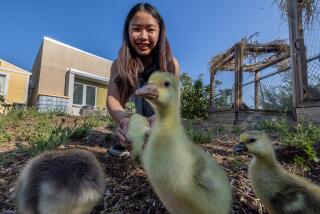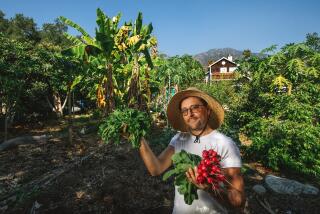Save College Farm
- Share via
I strongly support the preservation of the Pierce College Farm, for both educational and ecological reasons. Fortunately, with wise leadership the farm can be saved and transformed into a showplace to enhance the community and environment.
Brainstorming with our members brought forth a number of exciting, profit-making ideas. Pierce Farm can offer a multitude of courses for future executives, courses spanning every facet of agriculture: freezing and storing, retailing, restaurant management, agronomy, wholesaling, diets and nutrition, on and on.
Farm foods can be served in student snack bars and student and faculty dining rooms.
These days, nurseries are very profitable. People buy houseplants to decorate and to cut down on toxic indoor air. They buy fresh and dry herbs. They buy exotic fruits and vegetables. Local residents want to see demonstration gardens, including xeric plantings for drought-stricken inland valleys.
In the old days, people drove from all parts of the Valley to shop at the farm store. The store can be enlarged and refurbished. In addition to fresh eggs and milk, many new items can be added, such as fresh yogurt and cheeses.
All customers want better-tasting flavorful fruits and vegetables, not unripe mass-produced items transported hundreds of miles by truck, picked green and doused in chemicals to “ripen.”
The farm can sell seeds throughout the United States by mail order--and what learning opportunities for students. A florist shop would boom. Just check local prices. How about solar-heated greenhouses?
In Pennsylvania, a small sheep farm had been abandoned. Then a new herd was introduced. Wool was spun, loomed and articles sold to shops. Today the farm buys additional wool, as well as cotton, silk and flax, and its product are sold from Milan to Tokyo. Prices are high because people are willing to pay a lot for hand-loomed items.
An emphasis on composting and biodynamic gardening could increase output to an amazing degree. Farmers once plagued by bugs have given up pesticides and report excellent results with alternative methods. Composting could cure soil depleted by overuse of chemical fertilizers.
With urban development stifling the population, the preservation of the Pierce Farm is of untold value to the community, a refuge, an open space, and it can be a financial success. The farm would provide a vast array of teaching tools. Above all, it is a step forward in nurturing the earth.
RUTH LORING
Calabasas
Loring wrote on behalf of the board of the Calabasas Historical Society.






